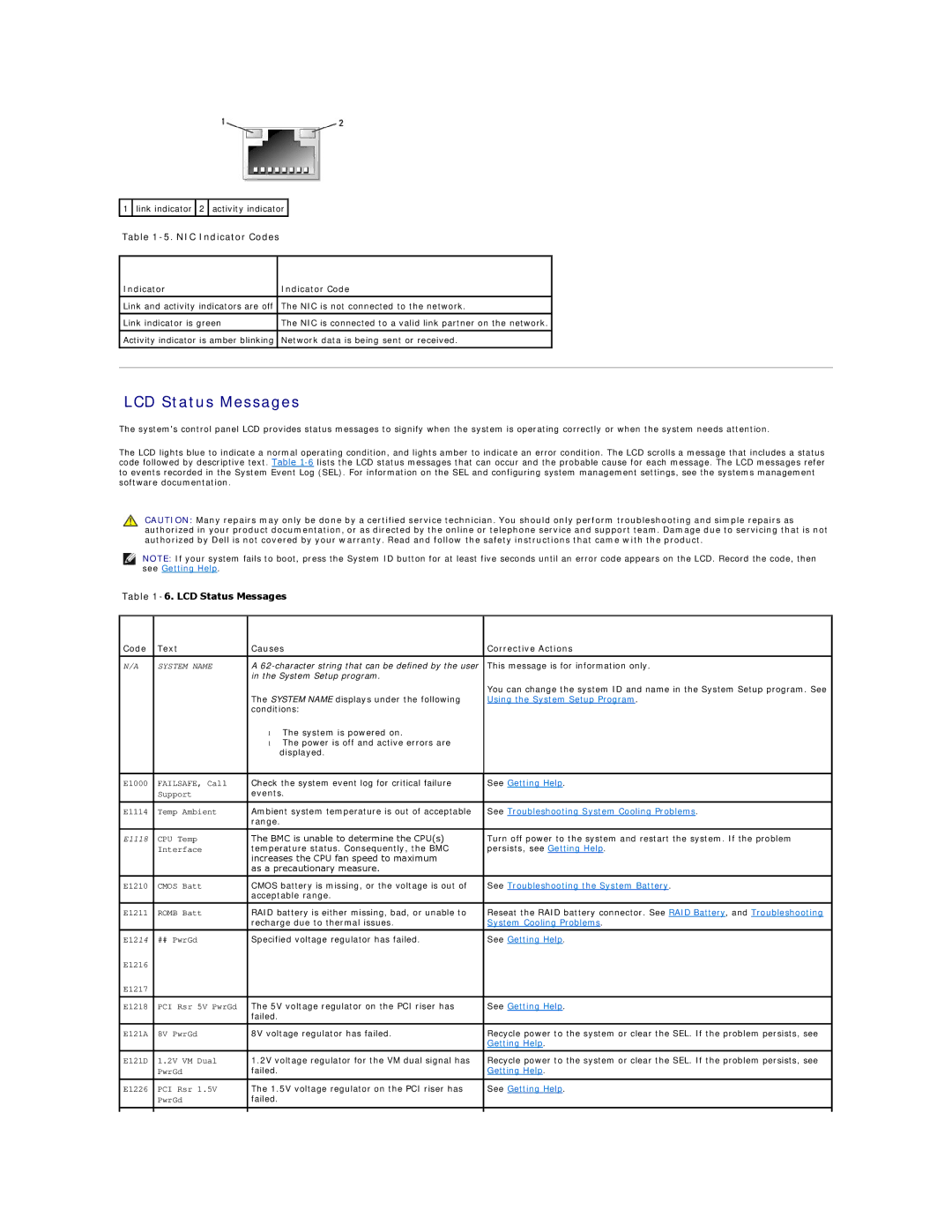
![]() 1
1 ![]() link indicator
link indicator ![]() 2
2 ![]() activity indicator
activity indicator ![]()
Table 1-5. NIC Indicator Codes
Indicator | Indicator Code |
|
|
|
|
Link and activity indicators are off | The NIC is not connected to the network. |
|
|
|
|
Link indicator is green | The NIC is connected to a valid link partner on the network. |
|
|
|
|
Activity indicator is amber blinking | Network data is being sent or received. |
|
|
|
|
LCD Status Messages
The system's control panel LCD provides status messages to signify when the system is operating correctly or when the system needs attention.
The LCD lights blue to indicate a normal operating condition, and lights amber to indicate an error condition. The LCD scrolls a message that includes a status code followed by descriptive text. Table
CAUTION: Many repairs may only be done by a certified service technician. You should only perform troubleshooting and simple repairs as authorized in your product documentation, or as directed by the online or telephone service and support team. Damage due to servicing that is not authorized by Dell is not covered by your warranty. Read and follow the safety instructions that came with the product.
NOTE: If your system fails to boot, press the System ID button for at least five seconds until an error code appears on the LCD. Record the code, then see Getting Help.
Table 1-6. LCD Status Messages
Code | Text | Causes | Corrective Actions |
|
|
|
|
N/A | SYSTEM NAME | A | This message is for information only. |
|
| in the System Setup program. |
|
|
|
| You can change the system ID and name in the System Setup program. See |
|
| The SYSTEM NAME displays under the following | Using the System Setup Program. |
|
| conditions: |
|
|
| • The system is powered on. |
|
|
| • The power is off and active errors are |
|
|
| displayed. |
|
|
|
|
|
E1000 | FAILSAFE, Call | Check the system event log for critical failure | See Getting Help. |
| Support | events. |
|
|
|
|
|
E1114 | Temp Ambient | Ambient system temperature is out of acceptable | See Troubleshooting System Cooling Problems. |
|
| range. |
|
E1118 | CPU Temp | The BMC is unable to determine the CPU(s) | Turn off power to the system and restart the system. If the problem |
| Interface | temperature status. Consequently, the BMC | persists, see Getting Help. |
|
| increases the CPU fan speed to maximum |
|
|
| as a precautionary measure. |
|
|
|
|
|
E1210 | CMOS Batt | CMOS battery is missing, or the voltage is out of | See Troubleshooting the System Battery. |
|
| acceptable range. |
|
E1211 | ROMB Batt | RAID battery is either missing, bad, or unable to | Reseat the RAID battery connector. See RAID Battery, and Troubleshooting |
|
| recharge due to thermal issues. | System Cooling Problems. |
E1214 | ## PwrGd | Specified voltage regulator has failed. | See Getting Help. |
E1216 |
|
|
|
E1217 |
|
|
|
|
|
|
|
E1218 | PCI Rsr 5V PwrGd | The 5V voltage regulator on the PCI riser has | See Getting Help. |
|
| failed. |
|
|
|
|
|
E121A | 8V PwrGd | 8V voltage regulator has failed. | Recycle power to the system or clear the SEL. If the problem persists, see |
|
|
| Getting Help. |
E121D | 1.2V VM Dual | 1.2V voltage regulator for the VM dual signal has | Recycle power to the system or clear the SEL. If the problem persists, see |
| PwrGd | failed. | Getting Help. |
E1226 | PCI Rsr 1.5V | The 1.5V voltage regulator on the PCI riser has | See Getting Help. |
| PwrGd | failed. |
|
|
|
|
|
|
|
|
|
